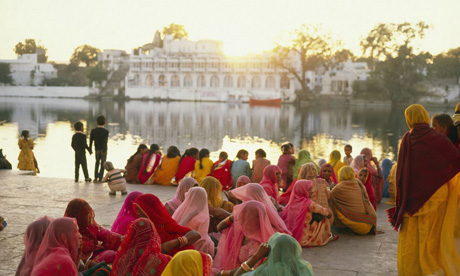India is split as Gandhi daughter shuns the sari
Western clothes highlight a generational divide over the symbolic importance of traditional dress
- The Observer,
- Sunday August 17 2008
- Article history

Priyanka Gandhi Vadra is eschewing the sari, unlike these women in Udaipur. Photograph: David Sutherland/Corbis
She is a member of that most famous of Indian families, the Gandhis, but Priyanka Gandhi Vadra stands accused of the most un-Indian of fashion crimes - ditching the sari in favour of western clothes.
The elegant daughter of ruling Congress party leader Sonia Gandhi has caused a stir in Delhi by turning up for a crucial parliamentary session in a tight-fitting white blouse and smart black trousers, topped with a wide belt.
Just as the women around President Nicolas Sarkozy have delighted and appalled members of French society with their aggressive deployment of haute couture, Vadra's fashion sense has divided opinion among India's chattering class. It has highlighted a generational divide over what constitutes correct attire set against a trend in Indian society away from traditional dress.
Female parliamentarians traditionally favour cotton or silk saris or the shalwar kameez trouser suit. So when Vadra arrived at the Lok Sabha, India's parliament, with her businessman husband Robert, to listen to her brother, Rahul Gandhi, speak in a crucial confidence debate on Prime Minister Manmohan Singh's Congress Party-dominated coalition government, her appearance turned heads.
Though the debate centred on whether India should sign a major agreement with the US on its nuclear future, it was 36-year-old Vadra's outfit that stole the show. Many news outlets carried a report describing her arrival as 'dramatic'.
Fashion pundits have been generally delighted. Surily Goel, a fashion designer and stylist, said a younger generation was finding its own style. 'You don't have to follow the norm all the time. As long as she was decently dressed that is fine. She represents a new India and that is how people dress these days,' she said. 'In general in India now women are more modern and more independent and career-orientated.' Leading feminist publisher Urvashi Butalia, who runs Zubaan Books, credited as India's first independent women's publishing house, welcomed the debate but said there was a tendency for some people to conflate western dress with the liberation of women. 'They equate western-style clothing with modernity,' she said. 'What is good about it is that women feel that they have a choice, but personally I don't think western clothes look great on Indian bodies.'
She said that when she was younger, she had rebelled against the sari by donning shalwar kameez and now young women were staging their own rebellion by wearing jeans. 'So who am I to argue?' she said.
Other political figures have been less sympathetic. 'I like to wear western formal but, as a serious parliamentarian, I would like to be seen in clothes that go with our culture,' the Times of India quoted MP Navin Jindal as saying.
Brinda Karat, a member of the Communist Party of India (Marxist), condemned the debate over what Vadra wore. 'This trivialises the whole issue of women in politics,' she said.
Although not an elected politician, Vadra has played a key role in campaigning for the party of which her mother is president and her brother general secretary. She also joined the two in Beijing for the opening ceremony of the Olympic Games.
The debate over her choice of clothes may have come as less of a surprise to Vadra's Italian-born mother, Sonia, who is said to have disliked Indian food and clothes when she first moved to India and caused a debate of her own when she was photographed in a miniskirt.
These days she is more likely to be seen in traditional clothing, as is Mayawati Kumari, another key female figure in Indian politics. But it is not just on the political scene that attitudes are changing. In West Bengal, teacher Kasturi Sen divided public opinion after she was barred from entering the school in which she taught in shalwar kameez
The school insisted that she wore a sari, something Sen argued was impractical for travelling on public transport. Last week the authorities were forced to cave in and allowed her to work in shalwar kameez
Last year it was the turn of France's female political figures to cause a stir. French justice minister Rachida Dati upset traditionalists by posing for Paris Match in a Dior dress and knee-high leather boots, while President Sarkozy's new wife, Carla Bruni, raised eyebrows when an old modelling photograph of her posing nude was bought at auction for £45,000.
--
Jean-Louis Kayitenkore
Procurement Consultant
Gsm: +250-08470205
Home: +250-55104140
P.O. Box 3867
Kigali-Rwanda
East Africa
Blog: http://www.cepgl.blogspot.com
Skype ID : Kayisa66




No comments:
Post a Comment